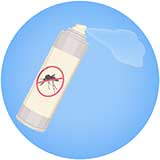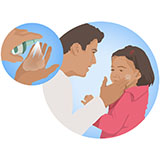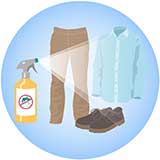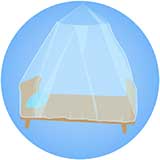Rift Valley Fever
What is Rift Valley fever?
Rift Valley fever (RVF) is an illness that is primarily spread by direct contact with blood, fluids, or tissues of infected animals such as cattle, buffalo, sheep, goats, and camels. Less commonly, it can also be spread through mosquito bites.
Most people with RVF do not feel sick or have only mild illness. Symptoms of RVF include fever, weakness, back pain, dizziness, and weight loss. However, a small percentage (8%–10%) of people may have more serious illness, such as severe bleeding, swelling of the brain, or eye disease. Approximately 1% of people who get RVF die from the disease.
Who is at risk?
Travelers who go to Africa are at risk of getting Rift Valley fever. Higher rates of disease are seen after rainfall and flooding. Travelers are at increased risk for RVF when sleeping outdoors and when working directly with animals.
What can travelers do to prevent Rift Valley fever?
Avoid exposure to animals or animal blood
- Do not handle raw meat.
- Wear protective equipment if working with animals.
Prevent mosquito bites
Use an EPA-registered insect repellent

- Use Environmental Protection Agency (EPA)-registered insect repellents with one of the active ingredients below. When used as directed, EPA-registered insect repellents are proven safe and effective, even for pregnant and breastfeeding women. If also using sunscreen, always apply insect repellent after sunscreen.
- DEET
- Picaridin (known as KBR 3023 and icaridin outside the US)
- IR3535
- Oil of lemon eucalyptus (OLE)
- Para-menthane-diol (PMD)
- 2-undecanone
Find the right insect repellent for you by using EPA's search tool.

- Insect Repellent Tips for Babies and Children
- Dress your child in clothing that covers arms and legs.
- Cover strollers and baby carriers with mosquito netting.
- When using insect repellent on your child:
- Always follow label instructions.
- Do not use products containing oil of lemon eucalyptus (OLE) or para-menthane-diol (PMD) on children under 3 years old.
- Do not apply insect repellent to a child’s hands, eyes, mouth, cuts, or irritated skin.
- Adults: Spray insect repellent onto your hands and then apply to a child’s face.
- If also using sunscreen, always apply insect repellent after sunscreen.
Wear long-sleeved shirts and long pants
Treat clothing and gear with permethrin

- Use 0.5% permethrin to treat clothing and gear (such as boots, pants, socks, and tents) or buy permethrin-treated clothing and gear.
- Permethrin is an insecticide that kills or repels insects like mosquitoes and sand flies.
- Permethrin-treated clothing provides protection after multiple washings.
- Read product information to find out how long the protection will last.
- If treating items yourself, follow the product instructions.
- Do not use permethrin products directly on skin.
- Watch the CDC video How to Use Permethrin.
Keep mosquitoes out of your hotel room or lodging
- Choose a hotel or lodging with air conditioning or window and door screens.
- Use a mosquito net if you are unable to stay in a place with air conditioning or window and door screens or if you are sleeping outside.
Sleep under a mosquito net

- Sleep under a mosquito net if you are outside or when screened rooms are not available. Mosquitoes can live indoors and bite during the day and night.
- Buy a mosquito net at your local outdoor store or online before traveling overseas.
- Choose a mosquito net that is compact, white, rectangular, with 156 holes per square inch, and long enough to tuck under the mattress.
- Permethrin-treated mosquito nets provide more protection than untreated nets.
- Permethrin is an insecticide that kills mosquitoes and other insects.
- To determine if you can wash a treated mosquito net, follow the label instructions.
If you are bitten by mosquitoes, avoid scratching the bites and apply over-the-counter anti-itch or antihistamine cream to relieve itching. See Mosquito Bite Symptoms and Treatment.
If you get sick during or after travel
If you feel sick during travel and think you may have RVF:
- Seek medical care.
- Use acetaminophen. Do not take pain relievers that contain aspirin or ibuprofen, which may lead to a greater tendency to bleed.
If you get sick after returning to the United States:
- Seek medical care. Tell your health care provider where and when you traveled.
Information for veterinarians and animal care workers
Although no vaccine for humans is available, several vaccines are licensed in other countries to prevent RVF in animals. Vaccinating livestock prevents the spread of infection to humans by decreasing the rate of disease in animals.
Traveler Information
Clinician Information
- Viral Hemorrhagic Fevers in CDC Yellow Book